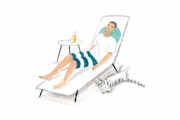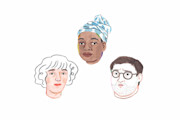The United States is in the midst of a mental health crisis. Given increasing political divides, civil unrest, economic uncertainties, grief over the hundreds of thousands of dead due to COVID-19, and the isolation of quarantine, it hardly comes as a surprise that our collective mental health is suffering.
And the isolation is no joke. At the time of this writing, America has been more or less locked down for one full year. During this year, day-to-day life has looked drastically different than pre-pandemic times; for one thing, kids who would normally be in school seven-plus hours a day, are now in their families’ homes all day long.
One-third of LGBTQ+ youth reported that they weren’t able to be themselves at home.
For some LGBTQ+ youth confined at home with unaccepting or even hostile families, this has been a nightmare.
A recent survey found that for over 40% of LGBTQ+ youth, COVID-19 has had an impact on their freedom to express their LGBTQ identity. Fifty-six percent of transgender and nonbinary youth are included in that number.
One-third of LGBTQ+ youth reported that they weren’t able to be themselves at home—and when you’re home 24 hours a day, seven days a week for nearly a year straight, that can take a serious toll on your wellness.
I spoke with James Guay, a licensed marriage and family therapist, about the mental health struggles facing LGBTQ+ youth and young adults stuck at home right now, and about strategies to help them through this period. Guay is a vocal opponent of the dangerous and homophobic practice of conversion therapy, and has taught classes and workshops related to LGBTQ+ issues at Esalen Institute, JFK University, and University of California Berkeley’s School of Law.
Isolated from support
“Right now, LGBTQ+ youth are experiencing what we’re all experiencing—limitations, isolation, stressors and traumas, grieving what’s going on in the world, and especially a lack of resources,” says Guay. “This is a time when youth are supposed to be developing a greater sense of autonomy and identity. The pandemic throws that out of balance and gives them less access to resources than they’d usually have.”
For some LGBTQ+ youth confined at home with unaccepting or even hostile families, this has been a nightmare.
LGBTQ+ youth stuck at home have lost social support connections like extracurricular activities, counseling and mental health resources, and the wider LGBTQ+ community—like Gender and Sexualities Alliances (GSAs). Some have also lost access to supportive adults such as understanding teachers, who help provide safe environments for them to socialize and grow.
For young adults who have been forced to return back home after moving away, the transition can be jarring.
According to Danushi Fernando, the director of LGBTQ+ and Gender Resources at Vassar College, around 225 students stayed on the college’s campus through the spring semester of 2020 for a variety of reasons—some of these students stayed because they didn’t feel safe quarantining at home with their families. At school, they had support in the form of social groups, counseling, and virtual gatherings.

“If LGBTQ+ youth are in homes with parents who are straight and cisgender, some of those parents may not know how to show up and validate their children or do the research to become better parents for sexual and gender minority youth. It leaves LGBTQ+ youth with a lack of validation and support, and sometimes with outright hostility or rejection,” Guay says.
In fact, only about a third of LGBTQ+ youth experience parental acceptance, whereas another third experience parental rejection. The remaining don’t disclose their sexual or gender identity until they are adults.
LGBTQ+ coping skills
So what can LGBTQ+ youth do to cope if they’re stuck in an invalidating or potentially hostile environment? James Guay says it’s about caring for the whole self.
These safe spaces give LGBTQ+ youth the opportunity to feel the sense of belonging and support they might otherwise be missing.
“It’s like four wheels of a car: one wheel is physical exercise, one is good nutrition, one is consistent and sufficient sleep, and one is social support. If one of the wheels is off, then it’s hard for the car to run.”
Of these four wheels, the most difficult one to address for many kids is social support. But there are online resources. Organizations like The Trevor Project provide space and forums where LGBTQ+ youth and young adults can talk to, chat, play games with, or watch movies with people of similar age and identities.
These safe spaces give LGBTQ+ youth the opportunity to feel the sense of belonging and support they might otherwise be missing.
“There’s a lot of research to show that those who have been forced to learn resilience by growing up under these adverse circumstances are those who recognize that they’re not the problem—that it’s society’s disease with sexual and gender diversity that’s the issue,” says Guay.
Believe that not only do you have a right to exist and that your voice matters but that you are inherently of value and worth.
“If they can detach the poisonous messages being sent their way and recognize that those messages are not theirs to own, and they’re perfectly fine the way they are, that can help them move toward self-acceptance and learn how to function in a healthy way while stuck at home.”
How can I help LGBTQ+ kids and young adults?
Amid the pandemic, we’re all finding it difficult to both give and receive support. The inability to physically be in the same place as the person you want to help can make the task of helping feel impossible.
“Having an adult figure who is supportive, whether they are a teacher, a therapist, a counselor, a family member—someone that gets and sees them—validate their experience, that’s an incredible help,” says Guay.

Supportive adults can share resources with LGBTQ+ youth. Examples include:
There are also resources that can help allies and advocates of any age:
James Guay says if there’s one thing he could say to all the LGBTQ+ kids who are struggling right now, it would be this:
“You’re of worth and value. That is your birthright. You don’t have to do anything to prove it, you can’t give it or take it away—it’s just there. If someone is telling you otherwise, they’re lying. Believe that not only do you have a right to exist and that your voice matters but that you are inherently of value and worth. If you’re hearing toxicity or invalidation, if you’re being denied your experience, don’t do that to yourself—be kind, caring, generous and spacious with yourself.”
The impact of childhood trauma
Childhood trauma is strongly linked to mental and physical health problems over a person's lifespan. Research suggests that LGBTQ+ children are more likely to experience childhood trauma than their heterosexuals peers.
The Adverse Childhood Experiences (ACE) assessment is a ten-question survey created by the Centers for Disease Control and Prevention and Kaiser Permanente.
The ACE assessment examines abuse (emotional, physical, and sexual), neglect (physical and emotional), and familial dysfunction (family mental illness, physical abuse of mother, divorce, incarcerated parent and substance abuse in family).
Curious about your own ACE score?
Take the Adverse Childhood Experiences (ACE) assessment today to get your ACE score. It's free and only takes 3 minutes to complete.
Try Monarch
You don't have to be diagnosed with a mental illness to benefit from therapy. Many people seek therapy for common problems like a breakup or divorce.
However, for therapy to be effective, it's important that you find the right therapist—someone you trust and who has the experience to help you make positive changes in your life. With a network of over 100,000 therapists, Monarch makes it easy to find and book the right therapist.
Green, A., Price-Feeny, M., & Dorison, S. (2020, October 08). Implications of COVID-19 for LGBTQ Youth Mental Health and Suicide Prevention. Retrieved January 13, 2021, from https://www.thetrevorproject.org/wp-content/uploads/2020/04/Implications-of-COVID-19-for-LGBTQ-Youth-Mental-Health-and-Suicide-Prevention
Katz-Wise, S. L., Rosario, M., & Tsappis, M. (2016). Lesbian, gay, bisexual, and transgender youth and family acceptance. Pediatric Clinics of North America, 63(6), 1011-1025.
New Poll Details Impact of COVID-19 and Recent Violence Against Black Americans on Youth Mental Health. (2020, October 01). Retrieved January 13, 2021, from https://www.thetrevorproject.org/trvr_press/new-poll-details-impact-of-covid-19-and-recent-violence-against-black-americans-on-youth-mental-health/
Valencia, M. (2020, June 29). The Challenges of the Pandemic for Queer Youth. The New York Times Retrieved: https://www.nytimes.com/2020/06/29/well/family/LGBTQ-youth-teenagers-pandemic-coronavirus.html





